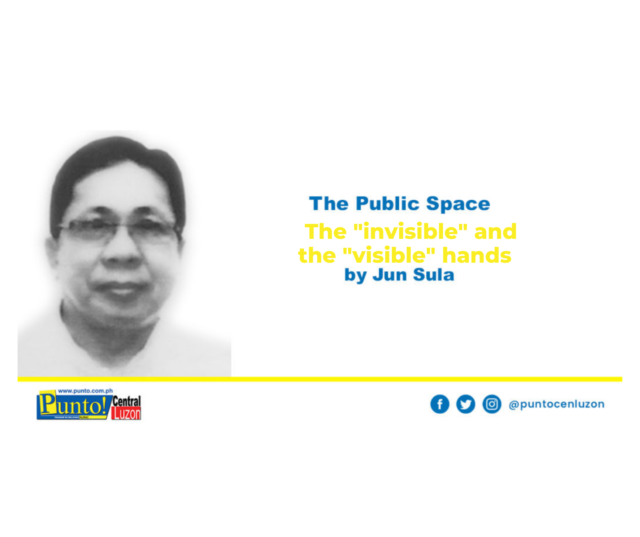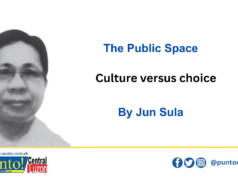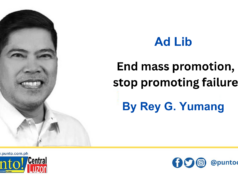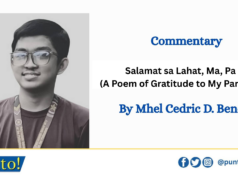One of the few normal things you can do in this time of profound health crisis, apart from eating and sleeping, is going to the market for basic necessities. And even that is a privilege, rare and difficult, given the restrictions in place from checkpoints to quarantine passes. For the latter, you either rule or reign to get out of the quarantined community as only one member of the household is entitled to have it: the battered housewife or the battered half.
And then there are other constraining factors: availability, or the lack, of resources and transport vehicles. (Along MacArthur Highway in San Fernando, I see a green- and-white bus plying the San Fernando-Angeles City route with no passenger but the driver, the bus moving at the speed of a turtle). These are the times when the huge fault between the poor and the rich, the haves and the have-nots threaten to divide society. For the former, there is the dilemma, a classic definition of which is a choice between two bad options. Risk getting hungry or risk getting the corona contagion. Like, picking your preferred poison.
I’ve been to the Pampang public market in Angeles City two or three times, using my driving my daughter to work, a healthworker to the city, as cover. The market is a virtual food oasis, and you wonder at the miraculous forces of free market in creating such abundance. Things would have gone awry had the government intervened, distorting the process that would have done more harm than good to the public. You don’t kill the goose that lays the golden eggs.
From eggs to eggplants, rice to root cropcrops, fruits to vegetables, seafoods to meat — there doesn’t to be anything missing. And you’re amazed how organized the whole thing is, from traffic management to parking lots, from sanitizing aides to barkers who reminds everyone about social distancing, you think it’s more about discipline than dystopia. The “visible hand” of leadership at work. It doesn’t matter if he’s from the jungle or the enclave.
Adam Smith, author of the Wealth of Nation, posited an “invicible hand” that takes care of the unhindered and osmosis-like flow of goods. What is at work, he said, is basically what happens when person pursues purely his personal gains without so much public interest as a top-of-mind motivation. Without him knowing it, that person promotes public interest in the process.
Price, of course, is a driving factor. My own estimate is that, personal gains can mean anything from profit to profiteering. Greed will come in the forms of overpricing and hoarding to create artificial shortage, thereby driving prices further up. Moderation and conscience may put a little brake on the spiral but, as one friend once told me, there’s no ethics in business. There goes the “invicible hand”.
Angeles City and Pampanga are luckier, geographically, because of their proximity to food production areas like Baguio City and Nueva Ecija. The prompt action in providing faster and special lanes to vehicles ferrying the goods has helped obviously in doing away with too many checkpoints that only delay the transport of goods.
But an oasis presupposes a desert. How many are suffering because of the lack of food or the means to buy them? Do elected leaders know and, more importantly, do they care? Many politicians are more invisible than the “invisible hand” these days. The revenge might come in 2022. The government has been promising heaven with cash and relief goods. Many are still waiting for the promise to take on something more concrete. In the meantime, the can do nothing apart from wring their fingers and get heartbroken for their families struggling for survival.
Recession, according to former Budget Secretary Ben Diokno, is upon us. Meanng, there is less money around to match the food oases whereever they are. Times like this, disciples of the Keynisian concept believe government must do something, more like “visible hand” to counter balance the excesses or shortcomings of the “invisible hand”. Even then, corona virus that hangs like the sword of Damocles that respects no person, is constrained. All it can do for now, apparently, is dole-outs.
And then, don’t forget another virus that we have to expel from our system: corruption. Looking back, potential carriers from China may have come unbridled into our shores because of the “pastillas” scheme. The voice of the late Sen. Miriam Defensor Santiago resonates like an echo in the wilderness.
The lives of people have been teared, some irreparably, by C0VID 19. Two more weeks of hardships and uncertainties loom on the horizon. Competent and compassionate leaderships in the private and public sectors can help save lives, and the country, from further damage.
The challenge is how to bring the food oases more accessible to people in the food deserts. Life is basically about access. The work of the “invisible hand” must not be hampered. The work of the “visible hand” must provide the missing part. The upshot may not be ideal. But the alternative might be riskier than the virus itself.
Failure or disaster is never an option because peoples’ lives do matter.





